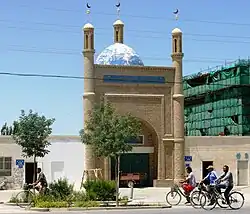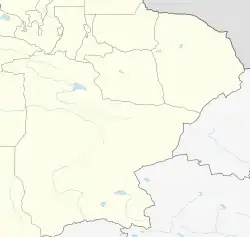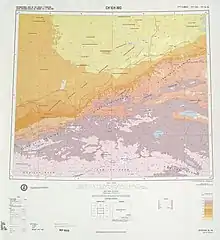Ruoqiang Town
Ruoqiang Town (Chinese: 若羌; pinyin: Ruòqiāng; Uyghur: Чакилик: Qakilik or Charkliq) is a town in Ruoqiang County, Bayin'gholin Mongol Autonomous Prefecture in southeastern Xinjiang, People's Republic of China. Ruoqiang Town is the county seat of the Ruoqiang County, and therefore is the place that less detailed maps label as "Ruoqiang County" or just "Ruoqiang". The postal code is 841 800.
Ruoqiang
چاقىلىق 若羌镇 Qakilik, Jo-ch'iang | |
|---|---|
 A mosque in Ruoqiang | |
 Ruoqiang Location in Xinjiang | |
| Coordinates: 39°01′05″N 88°10′05″E | |
| Country | China |
| Region | Xinjiang |
| Prefecture | Bayingolin Mongol Autonomous Prefecture |
| County | Ruoqiang |
| Area | |
| • Total | 5.6 km2 (2.2 sq mi) |
| Elevation | 897 m (2,943 ft) |
| Population (2010)[2] | |
| • Total | 9,872 |
| • Density | 1,800/km2 (4,600/sq mi) |
| Time zone | UTC+8 (China Standard[3]) |
| Postal code | 841800 |
| Telephone area code | 0966 |
There is a two-laned asphalt highway to Korla, 490 km (304 mi) north, and 956 km (594 mi) west to Hotan. There is no motorable road east to Dunhuang in Gansu,[4] but one can now drive southeast through the Altun Shan range and then north through part of the Tsaidam to Dunhuang.
Names
Lionel Giles has recorded the following names for Ruoqiang Town (with his Wade-Giles forms of the Chinese names converted to pinyin):
- "Yixun, or Yixiu, capital of Shanshan after 77 B.C. (Note: This is an incorrect identification, the capital's name was, in fact, Yüni 扜泥.)[5]
- Shanshan Zhen [Sui].
- Nafubo (纳缚波) [Xuanzang].
- Dianhe [Tang].
- Shicheng Zhen [Tang after A.D. 675].
- Great Nob [Tibetan records].
- City of Lop [Marco Polo]
- Charkhlik [modern name]."[6]
History

During the latter part of the Former Han and throughout the Later Han the capital of the kingdom of Shanshan was known as Yüni 扜泥, which was located near the present town of Ruoqiang.[7]
Ruoqiang Town was established in 1984.[8]
In 2014, Xincheng and Loulan were established as residential communities.[9]
Geography

Almost adjacent to the town are the Tieganlike Town, to the east, and Wutamu Township, to the west. They, however, are not administratively part of Ruoqiang Town, but are separate township-level administrative units.
Ruoqiang Town was used by numerous notable explorers as a launching point to the Lop Nor archaeological sites, which are located within 150–200 km (93–124 mi) to the northeast.
Climate
Ruoqiang has a cold desert climate (Köppen climate classification BWk) with extreme seasonal variation in temperature. The monthly 24-hour average temperature ranges from −7.4 °C (18.7 °F) in January to 27.5 °C (81.5 °F), and the annual mean is 11.7 °C (53.1 °F). Precipitation totals only 29 millimetres (1.1 in) annually, and mostly falls in summer. No month has less than 60% of possible sunshine, and the area receives close to 3,100 hours of bright sunshine annually.
| Climate data for Ruoqiang (1991–2020 normals) | |||||||||||||
|---|---|---|---|---|---|---|---|---|---|---|---|---|---|
| Month | Jan | Feb | Mar | Apr | May | Jun | Jul | Aug | Sep | Oct | Nov | Dec | Year |
| Average high °C (°F) | −0.6 (30.9) |
6.9 (44.4) |
16.8 (62.2) |
25.2 (77.4) |
30.3 (86.5) |
34.5 (94.1) |
36.3 (97.3) |
34.9 (94.8) |
29.9 (85.8) |
21.6 (70.9) |
10.8 (51.4) |
1.0 (33.8) |
20.6 (69.1) |
| Daily mean °C (°F) | −7.5 (18.5) |
−0.9 (30.4) |
8.2 (46.8) |
16.4 (61.5) |
21.4 (70.5) |
26.1 (79.0) |
27.9 (82.2) |
26.0 (78.8) |
19.8 (67.6) |
10.9 (51.6) |
2.2 (36.0) |
−5.7 (21.7) |
12.1 (53.7) |
| Average low °C (°F) | −13.0 (8.6) |
−7.4 (18.7) |
0.3 (32.5) |
8.0 (46.4) |
12.6 (54.7) |
17.6 (63.7) |
19.7 (67.5) |
17.7 (63.9) |
11.6 (52.9) |
3.2 (37.8) |
−3.7 (25.3) |
−10.6 (12.9) |
4.7 (40.4) |
| Average precipitation mm (inches) | 1.3 (0.05) |
0.5 (0.02) |
0.6 (0.02) |
1.0 (0.04) |
3.3 (0.13) |
8.2 (0.32) |
9.5 (0.37) |
6.4 (0.25) |
1.2 (0.05) |
0.4 (0.02) |
0.6 (0.02) |
1.5 (0.06) |
34.5 (1.35) |
| Average precipitation days (≥ 0.1 mm) | 1.4 | 0.4 | 0.4 | 0.7 | 1.5 | 3.1 | 2.6 | 1.3 | 0.6 | 0.2 | 0.4 | 1.3 | 13.9 |
| Average snowy days | 3.2 | 1.0 | 0.2 | 0.1 | 0 | 0 | 0 | 0 | 0 | 0 | 0.5 | 3.2 | 8.2 |
| Average relative humidity (%) | 58 | 43 | 29 | 26 | 31 | 36 | 40 | 42 | 45 | 48 | 51 | 60 | 42 |
| Mean monthly sunshine hours | 190.7 | 192.0 | 232.5 | 253.5 | 284.5 | 283.2 | 280.9 | 279.3 | 278.1 | 274.8 | 219.4 | 180.2 | 2,949.1 |
| Percent possible sunshine | 63 | 62 | 62 | 63 | 64 | 64 | 63 | 67 | 76 | 81 | 74 | 62 | 67 |
| Source: China Meteorological Administration[10][11] | |||||||||||||
| Climate data for Tieganlike Station, Ruoqiang County (1991–2020 normals) | |||||||||||||
|---|---|---|---|---|---|---|---|---|---|---|---|---|---|
| Month | Jan | Feb | Mar | Apr | May | Jun | Jul | Aug | Sep | Oct | Nov | Dec | Year |
| Average high °C (°F) | −0.4 (31.3) |
7.1 (44.8) |
16.1 (61.0) |
24.6 (76.3) |
30.0 (86.0) |
34.1 (93.4) |
35.7 (96.3) |
34.8 (94.6) |
29.5 (85.1) |
21.2 (70.2) |
10.7 (51.3) |
1.0 (33.8) |
20.4 (68.7) |
| Daily mean °C (°F) | −8.6 (16.5) |
−1.7 (28.9) |
7.6 (45.7) |
16.2 (61.2) |
21.7 (71.1) |
26.2 (79.2) |
27.7 (81.9) |
26.1 (79.0) |
19.8 (67.6) |
10.5 (50.9) |
1.5 (34.7) |
−6.7 (19.9) |
11.7 (53.1) |
| Average low °C (°F) | −15.5 (4.1) |
−9.4 (15.1) |
−0.6 (30.9) |
7.9 (46.2) |
13.1 (55.6) |
18.1 (64.6) |
20.0 (68.0) |
18.2 (64.8) |
11.8 (53.2) |
2.7 (36.9) |
−5.2 (22.6) |
−12.5 (9.5) |
4.1 (39.3) |
| Average precipitation mm (inches) | 0.5 (0.02) |
0.4 (0.02) |
0.9 (0.04) |
2.5 (0.10) |
4.5 (0.18) |
9.3 (0.37) |
7.3 (0.29) |
5.6 (0.22) |
1.3 (0.05) |
2.4 (0.09) |
0.4 (0.02) |
0.8 (0.03) |
35.9 (1.43) |
| Average precipitation days (≥ 0.1 mm) | 0.8 | 0.3 | 0.3 | 0.8 | 2.0 | 3.1 | 3.6 | 2.2 | 0.9 | 0.6 | 0.3 | 0.9 | 15.8 |
| Average snowy days | 2.8 | 0.5 | 0.2 | 0.1 | 0 | 0 | 0 | 0 | 0 | 0 | 0.5 | 2.8 | 6.9 |
| Average relative humidity (%) | 61 | 47 | 32 | 29 | 30 | 36 | 40 | 41 | 44 | 50 | 55 | 65 | 44 |
| Mean monthly sunshine hours | 191.1 | 197.5 | 228.2 | 241.9 | 277.8 | 276.1 | 281.9 | 289.8 | 275.3 | 265.1 | 216.9 | 177.0 | 2,918.6 |
| Percent possible sunshine | 63 | 65 | 61 | 60 | 62 | 61 | 62 | 69 | 75 | 79 | 74 | 62 | 66 |
| Source: China Meteorological Administration[10][12] | |||||||||||||
Administrative divisions

As of 2018, the town was made up of five residential communities:[1][13][8]
Residential Communities
Transportation
The town is the junction of China National Highway 315 and China National Highway 218, and is the southern terminus of the latter.
References
- 行政区划. 若羌县人民政府网站 (in Chinese). Retrieved 1 January 2020.
全县共有4乡4镇,25个行政村、8个社区 若羌镇(驻团结路社区,辖4个社区) 团结路社区 社区居委会 文化路社区 新城社区{...}一、若羌镇 若羌镇位于218、315国道交汇处,为若羌县人民政府驻地,周边分别与铁干里克乡、吾塔木乡相邻,行政面积5.6平方公里。镇辖文化、团结、胜利三个社区,均成立于1984年,辖区内有行政企事业单位105个(其中重点单位23个),常住总人口9334人,分别由维、汉、回等15个民族组成,其中:农业户籍1351人,非农业户籍7983人。 (1)文化路社区基本情况 文化社区居委会成立于1984年,位于东环路以西,西环路以东,文化路以南区域,辖区面积4.23平方公里。 (2)胜利路社区基本情况 胜利社区居委会成立于1984年,位于东环路以西,西环路以东,建设路以北,Z590专线以南区域,辖区面积0.68平方公里。 (3)团结路社区基本情况 团结社区居委会成立于1984年,位于东环路以西,西环路以东,文化路以北,建设路以南区域,辖区面积0.69平方公里。{...
} - 若羌县历史沿革 [Ruoqiang County Historical Development] (in Simplified Chinese). XZQH.org. 30 January 2015. Retrieved 4 December 2019.
2010年第六次人口普查,若羌县常住总人口35580人,其中:若羌镇9872人,
- Officially Beijing Time, but locals in Xinjiang observe a different offset. See Xinjiang#Time
- "Charklik / Ruoqiang - Ancient Kingdom and Outpost Gateway". centralasiatraveler.com. Archived from the original on 2009-03-05. Retrieved 2009-03-05.
- Paula (1994), pp. 202-205.
- Giles (1930-1932), p. 845.
- Hill (2015) Vol.I, pp. 93-94.
- 若羌镇 [Ruoqiang Town] (in Simplified Chinese). XZQH.org. 13 December 2010. Retrieved 1 January 2020.
1984年设若羌镇。1985年,城镇面积2.4平方千米,{...}【2009年代码】652824100:~001胜利社区 ~002文化社区 ~003团结社区
- 2014年统计用区划代码和城乡划分代码:若羌镇 [2014 Statistical Area Numbers and Rural-Urban Area Numbers: Ruoqiang Town] (in Simplified Chinese). National Bureau of Statistics of the People's Republic of China. 2014. Retrieved 14 January 2020.
代码 城乡分类 名称 652824100001 121 胜利社区居委会 652824100002 122 文化社区居委会 652824100003 121 团结社区居委会 652824100004 121 新城社区居委会 652824100005 121 楼兰社区居委
- 中国气象数据网 – WeatherBk Data (in Simplified Chinese). China Meteorological Administration. Retrieved 10 October 2023.
- 中国气象数据网 (in Simplified Chinese). China Meteorological Administration. Retrieved 10 October 2023.
- 中国气象数据网 (in Simplified Chinese). China Meteorological Administration. Retrieved 10 October 2023.
- 2018年统计用区划代码和城乡划分代码:若羌镇 [2018 Statistical Area Numbers and Rural-Urban Area Numbers: Ruoqiang Town] (in Simplified Chinese). National Bureau of Statistics of the People's Republic of China. 2018. Retrieved 1 January 2020.
统计用区划代码 城乡分类代码 名称 652824100001 121 胜利社区居民委员会 652824100002 122 文化社区居民委员会 652824100003 121 团结社区居民委员会 652824100004 121 新城社区居民委员会 652824100005 121 楼兰社区居民委员会
Further reading
- Giles, Lionel (1930–1932). "A Chinese Geographical Text of the Ninth Century." BSOS VI, pp. 825–846.
- Paula, Christa (1994): The Road to Miran: Travels in the Forbidden Zone of Xinjiang. HarperCollins, Great Britain. Flamingo edition 1995.